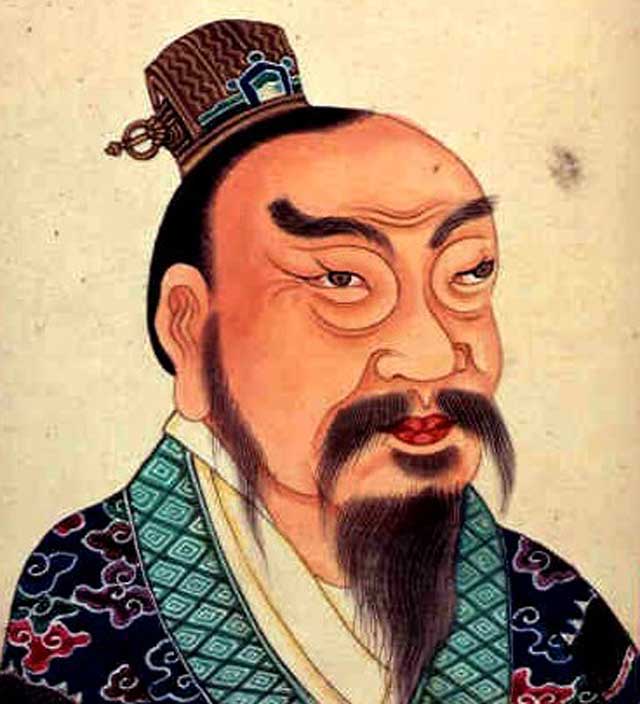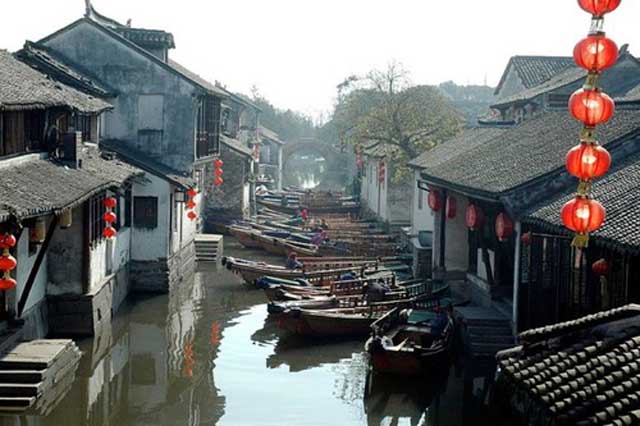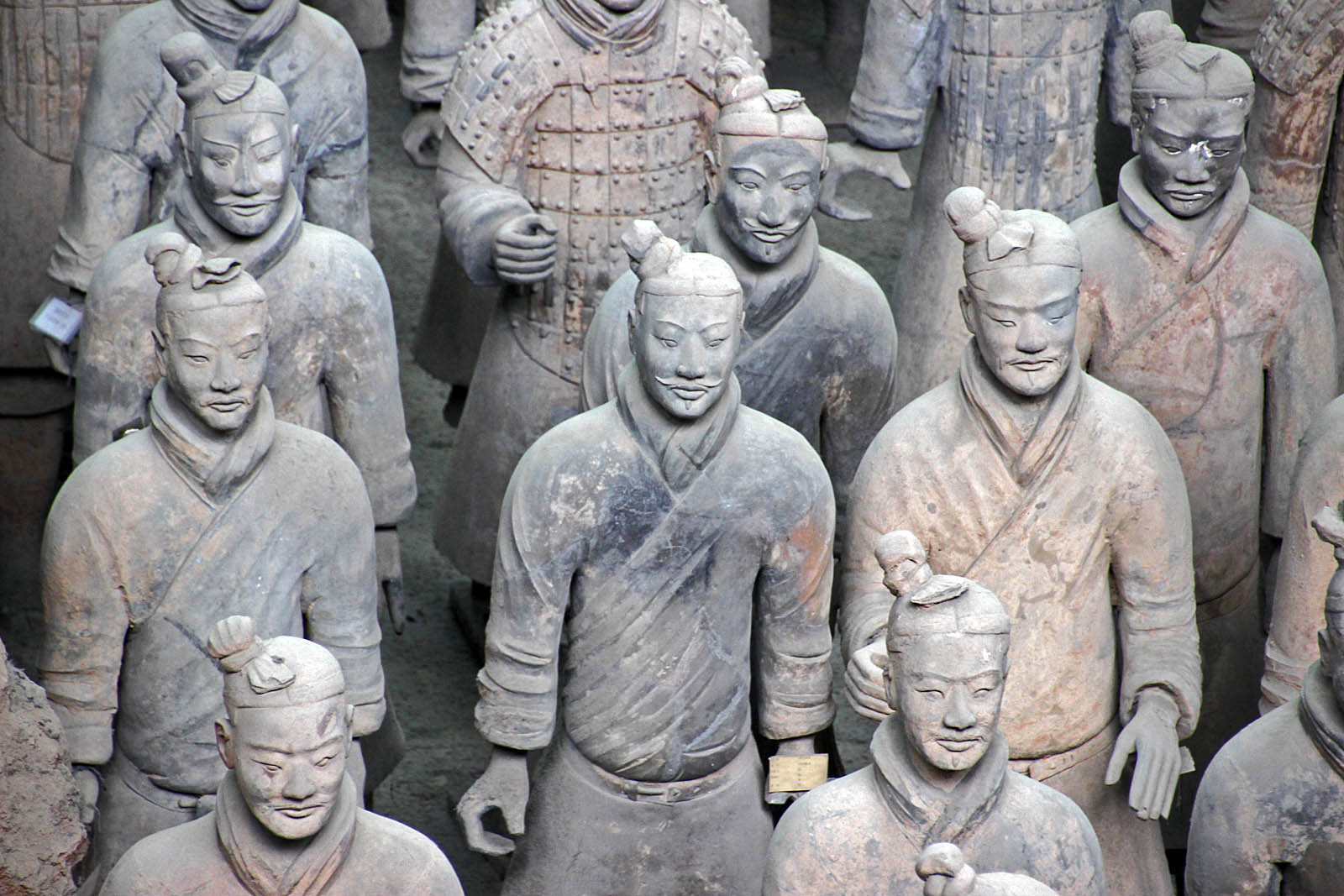“The two most far-sighted and influential political figures in the history of mankind,” wrote the British historian Arnold Toynbee, “are Caesar, who founded the Roman Empire, and Liu Bang, who founded the Han Empire.”
Historians today are less hasty to ascribe such influence to individual leaders. We are more likely to follow the lead of Toynbee’s contemporary, the French historian Fernand Braudel, who likened events and individuals to mere “surface disturbances, crests of foam that the tides of history carry on their strong backs.”

Liu-Bang, or Emperor Gaozu of Han
Yet it is undeniable that some individuals do change the course of history through sheer force of will – not to mention a remarkable degree of luck. Such a person was Liu Bang, who rose from obscurity to be crowned emperor of China 2215 years ago this month on the 28th of February, 202 BCE.
As founder of the Han dynasty, Liu Bang also became the symbolic father of the Han people. One fifth of the world’s population now self-identifies as “Han Chinese.” His legacy, then, is a multifaceted one. In the popular imagination in the West, the present-day People’s Republic tends to be regarded as antithetical to the imperial system that preceded it. Yet it is interesting to reflect on the continuities in leadership and culture that persisted across revolutions and upheavals – and on the fact that the founder of China’s greatest imperial dynasty was, like Mao, a commoner.
As with many dynastic founders, it is difficult to separate the truth about Liu Bang—or the Emperor Gaozu of Han, as he came to be known—from the legendary tales about his life and character that proliferated in posthumous histories of his reign. This process of myth-making was initiated by Liu Bang himself upon his ascension to the Dragon Throne. From the chronicles of his reign, we learn that he had a “dragon-like” face, sported an auspicious pattern of moles on his left thigh, and that a glowing dragon appeared in a rainstorm during his mother’s pregnancy as a harbinger of his greatness.
Today, what stands out about Liu Bang’s story is not only his immense importance as a founder of famous dynasty and shaper of Chinese culture, but also his humble origins: Liu Bang was born a peasant. Thus few details about his life before becoming emperor exist.
Whereas his great rival for the throne, Xiang Yu, hailed from an ancient family of patrician military leaders, Liu was an unknown. He was born in a small village in the present-day Jiangsu province on the eastern coast of China. Home to canals, fisherfolk and small-hold farmers, it was a peripheral region relatively far from the centers of power at Xi’an and the North China Plain.

Jiangsu province is a watery coastal region, famed for its canals since ancient times. This photograph shows the historic town of Zhouzhuang
Sources differ on Liu’s temperament as a child: he is variously described as good-natured, slothful, charismatic, and mediocre. His parents’, likewise, are a cipher; even their names are unknown, although they were granted respectful titles upon his coronation (“Sir Liu” and “Madam Liu”). They were farmers, working the rice paddies that stretched out from the Yellow River northward over the low swamplands of Jiangsu.
In his late twenties, however, Liu improved his condition by passing the civil service exam—high marks on government tests were a powerful engine of upward mobility in China, then and today— and he became a minor provincial official. By this time, it would seem, his personal qualities were becoming apparent: Liu married well above his social station, to Lü Zhi, the daughter of a wealthy country gentleman.
By his forties, Liu seems to have become a popular local political figure, noted for his magnanimous nature. But he was not a particularly powerful man. There were thousands like him, local magistrates whose tax-collecting and governance allowed the first emperor of China, Qin Shi Huangdi, to sustain his rule.

The famed terracotta soldiers at the mausoleum of Qin Shi Huangdi, discovered by local farmers in 1972. Remarkably, each soldier appears to have been a portrait of an individual soldier in Qin's army.
The event that would change Liu’s life converged in a fascinating way with the vast mausoleum of terracotta soldiers for which Emperor Qin is most famed today. Liu was charged with escorting a group of prisoners to the mausoleum, where they would toil at its construction. By this time, the misrule of Qin’s feckless son had resulted in widespread peasant revolts, and it seems Liu decided to take common cause with his own prisoners, becoming an outlaw and rebel himself.
The story of how Liu gained the throne is incredibly complex, and involves a series of double-dealings between the peasant leader and the man who was widely predicted to become the next emperor, the young nobleman and general Xiang Yu. Despite their vastly different upbringings, the two men had much in common: both scorned books, learning and historical precedent, and both were wildly ambitious. “Books are only useful in helping me remember my name,” Xiang had boasted as a youth. “Mastering swordsmanship allows me to face only one opponent, so it’s not worth learning. I want to learn how to defeat 10,000 enemies.” Liu appears to have shared this sentiment, and the two rebel leaders were initially friends and allies.
This all changed, however, as the rebel forces won a number of victories, and by the time they were encamped outside Xi’an, the Qin capitol, a tense stand-off took place between the supporters of Xiang and Liu. On a dramatic night worthy of a Shakespearian tragedy, the two men and their supporters held an elaborate banquet known as the Feast at Hong Gate at which both had made plans to execute the other.
Liu Bang narrowly avoided his own assassination and fled with his army. Four years later, in 202 BCE, Xiang lay dead by his own hand, clearing the path for Liu to ascend the throne. He was the first peasant to found a Chinese imperial dynasty, and indeed one of the only imperial founders in history from such humble origins.
As emperor, Liu cannily played upon his identity as a farmer and common man, and became famed for his earthy and rustic ways. “Make it simple,” he was famously said to have ordered his chamberlain, when asked about the implementation of courtly etiquette. He lowered taxes on farmers and encouraged peaceful trade, but spent much of the rest of his life quashing rebellions in distant frontier regions to the north and west of the Han heartlands. By his death, the empire had expanded to become one of the largest in history up to that point.
To be sure, Liu was by no means a perfect ruler. Intrigues surrounding him and his numerous family members have been memorialized in a number of sordid stories, the worst of which involve the infighting between his consorts and children at court. (One particularly appalling, and perhaps apocryphal, account holds that Liu’s first wife amputated the limbs of his favorite mistress and forced her to wallow in a pigsty).
What is really important about Liu today, though, isn’t his character, his family or even the specifics of his reign. He was a world-historical figure, as Toynbee noted, and his larger importance stems from the enormous historical changes his reign set in motion. At its greatest extent, the Han empire pushed westward into the Turkic and Iranian western steppes of Asia, a world that we usually regard as separate from China. It was in this time that the Roman empire became aware of China, calling it ‘Seres,’ the land of silk (the Chinese called Rome ‘Da Qin,’ and seem to have regarded it as a sort of western mirror image of the Middle Kingdom). Liu Bang’s reign initiated the cultural connections and long-distance trade that brought about the Silk Road and, at a more distant historical remove, our own contemporary era of globalization.
